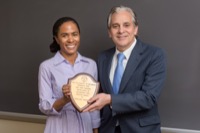
'Grandma Never Texted'
Student documentary on technology, relationships nominated for Emmy
10:27 a.m., Aug. 30, 2013--A documentary about the effects of new technology on relationships, written and produced by a University of Delaware undergraduate class, will compete on Sept. 7 for a regional Emmy award.
Grandma Never Texted: Changing Technologies, Changing Relationships explores the way couples from various generations have made use of technology in their personal lives. The half-hour documentary was produced by students in a Department of Communication class, "Broadcast News Documentary," during the spring 2012 semester and was nominated for a 2013 award.
Honors Stories
National Medal of Science
Warren Award
"This was a student project from start to finish," said Lydia Timmins, assistant professor of communication and an experienced television journalist. "I was an adviser, but the 17 students in the class conceived the idea, wrote the script and narrated, shot and edited the video. I asked some questions during the process, but they found the answers themselves."
Grandma Never Texted has aired on the University's Student Television Network and can be viewed on YouTube. The documentary examines six couples and the ways in which they have communicated during their years together. Some of the subjects are so-called Millennials, the same age group as the students, while others represent the Silent Generation that came of age in the 1950s and others are Baby Boomers.
In addition to video of the couples telling their own stories and discussing their feelings about communication and relationships, the documentary includes the perspective of experts from UD and elsewhere on changes in communication technology.
It was nominated for an Emmy in the category of college, long-form nonfiction by the Mid-Atlantic Chapter of the National Academy of Television Arts and Sciences. Also competing in that category this year are documentaries produced by students at Penn State and Temple universities.
Timmins thanked the communication department and the College of Arts and Sciences for support, including covering the costs for interested nominees to attend the Emmy ceremony. But she said that whichever group wins, the nomination — and the project itself — was invaluable.
"The entire project was a group effort," she said. "Students formed teams and divided the work, putting the documentary together and meeting a deadline the way you would find in a newsroom. It was very much a real-world experience, and that's the kind of hands-on experience employers want to see."
Article by Ann Manser








